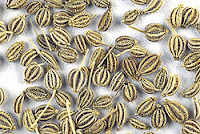Trachyspermum copticum, commonly known as ajwain, ajowan caraway, carom seeds or mistakenly as bishop's weed, is a plant of India and the Near East whose seeds are used as a spice.
Characteristics:
It is a small seed-like fruit plant, egg-shaped and grayish in colour.
Flavour and aroma:
Raw ajwain smells almost exactly like thyme because it also contains thymol, but is more aromatic and less subtle in taste, as well as slightly bitter and pungent.
Even a small amount of raw ajwain will completely dominate the flavor of a dish.
In Indian cuisine, ajwain is almost never used raw, but either dry-roasted or fried in ghee or oil. This develops a much more subtle and complex aroma, somewhat similar to caraway but "brighter".
History:
Ajwain originated in the Middle East, possibly in Egypt and the Indian subcontinent, but also in Iran, Egypt and Afghanistan.
Medicinal uses:
It is also traditionally known as a digestive aid, a relief for abdominal discomfort due to indigestion and an antiseptic.
Many assume it relieves colic in babies, and for children it also improves digestion and appetite.
A study conducted using the essential oil suggests that it has some use in the treatment of intestinal dysbiosis. Its benefit comes from being able to inhibit the growth of undesired pathogens while not adversely affecting the beneficial flora.

